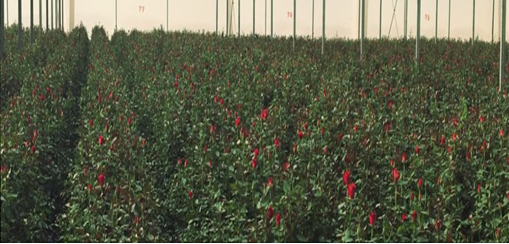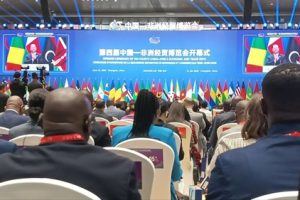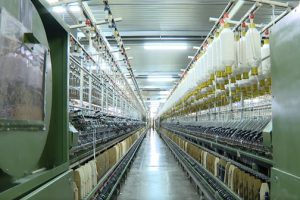
Ethiopia aspires to attain structural transformation through shifting from agricultural led economy in to industry led one. Currently, agriculture contributes more than 50 percent to the Gross Domestic Production (GDP) followed by the service and the manufacturing sectors.
As the main stay of the economy of more than 85% of the population who earn its living from the agricultural sector, it should be modernized, but it is characterized by rain fed, subsistence and vulnerable to extreme climate conditions so that it could not be satisfactory. Hence, to attain structural change, the stranded labor force working in agriculture sector must be shifted to the non- farming sectors. Side by side with these, promoting modern commercial farm which can attract foreign and local investment is vital.
Among the flourishing commercial farms; flower, fruit and vegetables and others can help to meet the aspiration for the development of self- sustained private led economy.
To encourage the private sector and smooth the inflow of capital to the sector, the government has taken various measures and among others; providing banking services and farm land in fair price, facilitating logistics, electric power and piped water supply and introducing new laws to help investors develop confidence.
Currently, flower products have been the second foreign currency earner next to coffee. The sector, in addition to creating job opportunities to the local community, it is delivering its social responsibility.

The Sher Ethiopia PLC, which produces roses, located near Zway Lake can be mentioned in this regard. The roses are grown in greenhouses that consist of a steel framework and a plastic cover. Approximately 12,500 employees grow, harvest, grade and pack roses at three farms. Between 2.5 and 4 million roses are processed and transported to the airport in Addis Ababa every day, from where the roses are flown by Ethiopian Airlines to Europe for further distribution. This makes the farm the largest rose grower in the world and the biggest rose supplier in Europe.
Ethiopia has excellent conditions for growing roses: fertile soil, a favorable climate, sufficient rainfall, and the right altitude. The horticultural sector is very important for the economy of Ethiopia. Sher Ethiopia is a major player and responsible for close to 4% of all foreign currency flowing into Ethiopia.
On top of supporting the nation’s economy by bringing foreign currency, the company is discharging its social responsibility via supporting the local community. To this end, it has done many things including constructing schools for the children of the community. Eleni Kebede, 20, was born in Batu town also known as Ziway, 168 kilometers south from Ethiopia’s capital, Addis Ababa. She is now a first year student at Wachemo University. Her study began at Sher Ethiopia School, which was established by Sher Ethiopia PLC, the biggest flower farm in Ethiopia and in the world as well.
She was only 4 years old when her mother who works at the farm dropped her at the school before starting work. So that she didn’t have to worry about Eleni as all the necessary facilities including meal, sleeping and playing materials with people who take care of the children are already made available by the school free of charge.
Since then, thousands of kids whose parents work at the flower farms and other children from the surrounding community have been benefited from the free education program.
“In terms of quality also Sher Ethiopia is the best school in Batu town. Many children aspire to go there,” Pastor Hobicho Debelo, leader of elders and religious fathers in Batu town said.
Today, the school has accommodated around 7,000 students from lower kindergarten level to 10 plus 2. The school supplies meals, school uniforms and all the necessary utensils and exercise books for all the children.
Ziway Roses PLC is one of the five rose farms within Sher Ethiopia rose farms that covers a total of 500 hectares of land. Depending on the size of their farm, the five farms sponsor around 200 students every year, according to Ermias Solomon, Operational Manager of Ziway Roses. Half of the parents of these children work while the remaining is selected from the community to benefit from the free school. “We do these as part of our Corporate Social Responsibility (CSR) and because we are Fair-trade Standard Certificate member,” Ermias said.
“Even though our contribution is like a drop in the ocean, we are glad to see those kids going to college today with our contribution,” he added.
In addition to free education and feeding program for those who are beneficiary of full scholarship, the flower farms have also been providing school supplies for up to 400 children annually to help those children go to school. According to Ermias, the hospital and stadium built by Sher Ethiopia have also been serving the community.
Azeb Teshome, 20, is also among the first batch of students of Sher Ethiopia School to go to college. She is also a first year student at Wolaita Sodo University. Two of her sisters including one who was recently awarded a laptop by the school for her best achievement are also beneficiaries of the free education program, which is often known as Ziway Flower Scholarship.
“Because of their close relationship with the community and their continuous support, these flower farms are considered by the community as their own properties. The farms are exemplary for other companies whatever field they are engaged in,” Nebi Gudeta, Investment Head at Batu City Administration in Oromia Region said.
Nebi said that he and other officials have witnessed the collaborations of the flower farms in their different projects from supporting job creation efforts of the city administration for the youth, to helping elders and people with disabilities as well as providing health insurance for hundreds of families.
Currently, in addition to the total of 20,000 employees working at the five flower farms, 471 youths are organized in an association by Batu City Administration have created linkages with the farms and are supplying various materials of sanitary products and stationeries and selling byproducts, according to Nebi.
In relation to employees’ tax income, the city administration is also collecting around 200 million Birr on average annually from the five farms, according to Nebi, who stressed the significance of the contributions of the rose farms to Batu City.
When it comes to hard currency generation from export of roses, Ziway Roses PLC, which operates only on 42 hectares, has been generating around 10 million Euros by selling 115 million stems per year – about 300,000 stems every day.
“These flower farms have lifted burden from many families…I urge the community to protect these investments and the government should also support them.”
“I wish they have the capacity to help more as the city has been expanding and the number of inhabitants has increased a lot over the past years,” Pastor Hobicho said.
While the lion’s share from the total 500 hectares of land is owned by the Dutch-based Sher Ethiopia Company, AQ Roses PLC and Herburg Roses each owns 40 hectares, and Braam Flowers covers 22 hectares of land.
When she completes her study, Eleni plans to become a lawyer and serve her community. “I am so grateful for what these companies have done for us. Such successful practice has to be encouraged and continue,” she suggested.
Eleni kebede: A sponsored student by Ziway Rose PLC
Ziway Roses farm
BY ABEBE WOLDEGIORGIS
THE ETHIOPIAN HERALD WEDNESDAY 13 DECEMBER 2023




